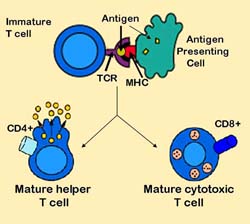
A healthy human body is equipped with a powerful immune system for resisting the attack of invading microorganisms. Unfortunately, the system sometimes goes awry and attacks the body itself. Autoimmunity is the failure of an organism to recognize its own constituent parts as "self", resulting in an immune response against its own cells and tissues. Disorder that results from such an aberrant immune response is termed an autoimmune disease.
CD4+ T cells are a member of white blood cells, are involved in activating and directing other immune cells, and are particularly important in the immune system. However, they are maintained in a homeostatic balance between their production and elimination. Otherwise, their dysregulation can cause autoimmunity
After many years of cooperation, two research teams headed respectively by PEI Gang and ZHANG Jingwu, both from the CAS Shanghai Institutes for Biological Sciences, have made encouraging progress in their studies into the regulation of CD4+ T cell survival and autoimmunity.
Their studies demonstrate that the multifunctional adaptor protein -arrestin 1, a group of proteins that is important for regulating signal transduction within cells, positively regulated naive and activated CD4+ T cell survival. Their experiments show that mice deficient in the gene encoding -arrestin 1 were much more resistant to experimental autoimmune encephalomyelitis, whereas its overexpression increased susceptibility to this disease.
As reported online on 9 June in the
Nature Immunity, the studies indicate that -arrestin 1 is critical for CD4+ T cell survival and is a factor in susceptibility to autoimmunity.





